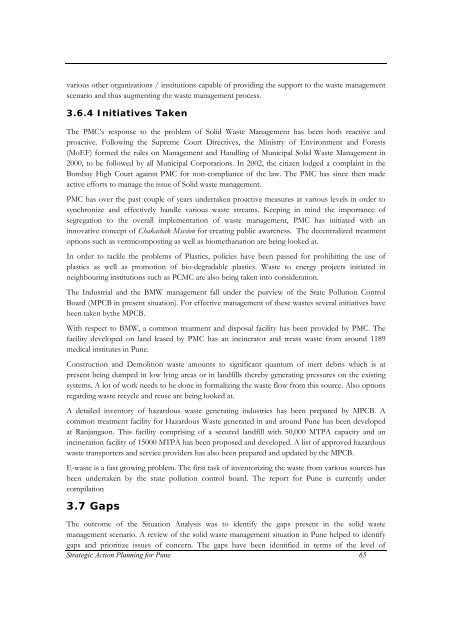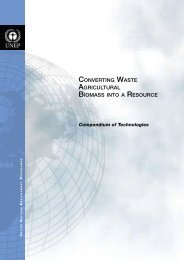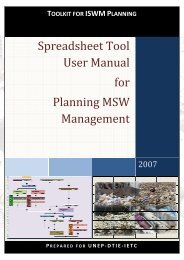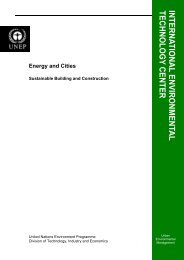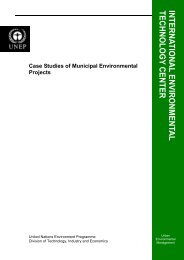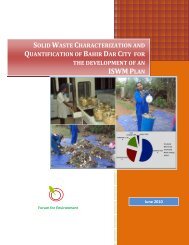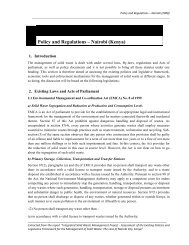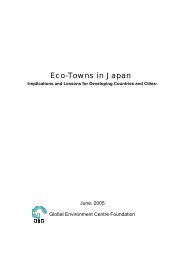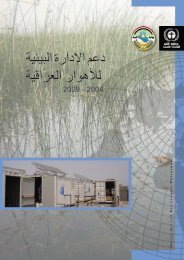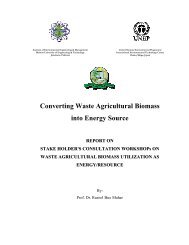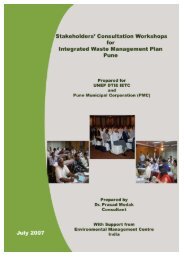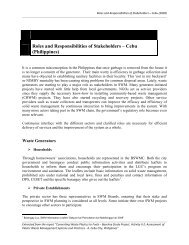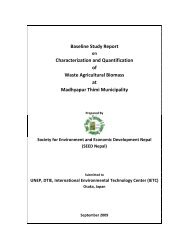Strategic Action Plan - International Environmental Technology Centre
Strategic Action Plan - International Environmental Technology Centre
Strategic Action Plan - International Environmental Technology Centre
You also want an ePaper? Increase the reach of your titles
YUMPU automatically turns print PDFs into web optimized ePapers that Google loves.
various other organizations / institutions capable of providing the support to the waste management<br />
scenario and thus augmenting the waste management process.<br />
3.6.4 Initiatives Taken<br />
The PMC’s response to the problem of Solid Waste Management has been both reactive and<br />
proactive. Following the Supreme Court Directives, the Ministry of Environment and Forests<br />
(MoEF) formed the rules on Management and Handling of Municipal Solid Waste Management in<br />
2000, to be followed by all Municipal Corporations. In 2002, the citizen lodged a complaint in the<br />
Bombay High Court against PMC for non-compliance of the law. The PMC has since then made<br />
active efforts to manage the issue of Solid waste management.<br />
PMC has over the past couple of years undertaken proactive measures at various levels in order to<br />
synchronize and effectively handle various waste streams. Keeping in mind the importance of<br />
segregation to the overall implementation of waste management, PMC has initiated with an<br />
innovative concept of Chakachak Msssion for creating public awareness. The decentralized treatment<br />
options such as vermicomposting as well as biomethanation are being looked at.<br />
In order to tackle the problems of Plastics, policies have been passed for prohibiting the use of<br />
plastics as well as promotion of bio-degradable plastics. Waste to energy projects initiated in<br />
neighbouring institutions such as PCMC are also being taken into consideration.<br />
The Industrial and the BMW management fall under the purview of the State Pollution Control<br />
Board (MPCB in present situation). For effective management of these wastes several initiatives have<br />
been taken bythe MPCB.<br />
With respect to BMW, a common treatment and disposal facility has been provided by PMC. The<br />
facility developed on land leased by PMC has an incinerator and treats waste from around 1189<br />
medical institutes in Pune.<br />
Construction and Demolition waste amounts to significant quantum of inert debris which is at<br />
present being dumped in low lying areas or in landfills thereby generating pressures on the existing<br />
systems. A lot of work needs to be done in formalizing the waste flow from this source. Also options<br />
regarding waste recycle and reuse are being looked at.<br />
A detailed inventory of hazardous waste generating industries has been prepared by MPCB. A<br />
common treatment facility for Hazardous Waste generated in and around Pune has been developed<br />
at Ranjangaon. This facility comprising of a secured landfill with 50,000 MTPA capacity and an<br />
incineration facility of 15000 MTPA has been proposed and developed. A list of approved hazardous<br />
waste transporters and service providers has also been prepared and updated by the MPCB.<br />
E-waste is a fast growing problem. The first task of inventorizing the waste from various sources has<br />
been undertaken by the state pollution control board. The report for Pune is currently under<br />
compilation<br />
3.7 Gaps<br />
The outcome of the Situation Analysis was to identify the gaps present in the solid waste<br />
management scenario. A review of the solid waste management situation in Pune helped to identify<br />
gaps and prioritize issues of concern. The gaps have been identified in terms of the level of<br />
<strong>Strategic</strong> <strong>Action</strong> <strong>Plan</strong>ning for Pune 65


